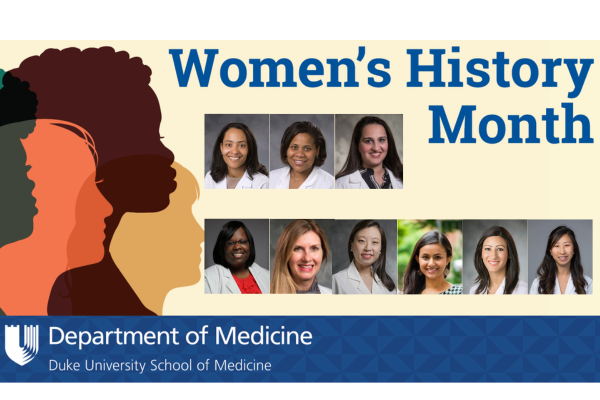
The Duke Department of Medicine Office of Diversity, Equity and Inclusion’s goal to build an equitable community includes a division-level focus, and it is being led in large part by women.
Nine of the 12 vice chiefs for Diversity, Equity and Inclusion (VCDEI) are represented by female faculty members who are dedicated to advancing equity in the community.
The Department of Medicine is large and represents many different areas of focus, so situating the VCDEIs at the division level makes sense, said Dr. Bryan Batch, VCDEI for the division of Endocrinology, Metabolism and Nutrition.
“Organizing the VCDEIs helps identify DEI-related needs and challenges related specifically to each division and develop interventions and professional opportunities that specifically address building equity in that division,” said Dr. Batch.
Batch has worked with faculty in the Division to revise the Endocrine Fellow Noon Conference curriculum to include more DEI topics.
VCDEIs partner with division chiefs and the Diversity, Equity and Inclusion IAR (DEIAR) committee to create an infrastructure for DEI within each division. VCDEIs serve as members of the DEIAR Committee, act as a liaison between DEIAR Committee and their respective divisions, and contribute to a DEI agenda focused on culture, recruitment, retention, education, and training within their divisions.
Dr. Fatima Zahara Syed is the VCDEI for the ambulatory side of the division of General Internal Medicine (GIM), the largest DOM division which encompasses hospital medicine, primary medicine, primary care and research faculty. The role of the VCDEI serves as a check on the divisions to ensure that “diversity, equity and inclusion matter from the top down,” she said.
Syed has conducted a culture survey of ambulatory medicine to better understand the needs of the division as it related to diversity, equity and inclusion.
“We came up with a survey that allowed us to get a pulse on the needs of the division and allowed us to separate results from hospital medicine and ambulatory side, so we could better understand nuances. From there, we could direct our interventions based on those needs,” she said. “This was particularly helpful because we finally were able to do a needs assessment in this space for our division.”
Dr. Syed also serves as a Civility Champion, a cohort of faculty and trainees trained on how to offer informal support in response to incidents of bias, harassment, or other unprofessional behaviors. “The Civility Champion program allows a brave/space for others to come to us to talk about issues they may be facing. It's been an honor to be an ear for others,” she added.
Having a seat at the table is an important first step at being able to assess and improve equity within the division and the department, according to Dr. Sonya Patel-Nguyen, GIM VCDEI for hospital medicine.
“It allows us to consider and also bring others to the table with us,” she said.
Within hospital medicine, some hiring goals and processes have been assessed and reframed with a new emphasis on equity with a goal of reassessing the implementation of that process in the coming year.
Having an equity leader in Palliative Care has led to a closer look at all aspects of the division’s work (clinical excellence, education, research, community engagement and team member experience) and applying the principles of equity, diversity and inclusion to all of these areas, noted VCDEI for Palliative Care, Dr. Karen Jooste.
“It has ensured that our division is committed to advancing equity, diversity and inclusion, and making real changes,” Dr. Jooste said.
Palliative care is collaborating with Lincoln Community Health Center, a local, outpatient primary care facility, to create a partnership to offer palliative care services to underserved patients in their homes. The Palliative Care team has also increased its community engagement by volunteering at Durham Rescue Mission.
In the education space, they have worked to ensure that the fellowship curriculum includes education on equity, diversity and inclusion, and they have expanded their Grand Rounds topics to promote interprofessional collaboration and a diversity of speakers and topics.
Working with leadership to promote DEI fosters an environment for growth and opportunity, said Dr. Yoon Hie Kim, VCDEI for the division of Geriatrics.
“I enjoy working with our leadership to foster an environment where people within our division and broader community are exposed to opportunities to learn and grow and have meaningful conversations across all levels,” she said. “I am committed to building and promoting equity and the role as VCDEI allows me to function within my sphere of influence.”
DEI efforts in Geriatrics include a variety of efforts such as curating topics and materials for division quarterly meetings, recruiting geriatrics grand rounds speakers, implementation of a microaggressions awareness tool, and an equity review for grants with collaborators from the Aging Center.
Enhancing DEI initiatives within Hematologic Malignancies and Cellular Therapy (HMCT) involves collaborating with divisional leadership to attract individuals from diverse backgrounds dedicated to DEI principles.
Moreover, Dr. Sanghee Hong, VCDEI for the HMCT division, has partnered with various teams at Duke Cancer Institute to enhance the inclusivity of our clinical trials by improving access and recruiting participants from racial and ethnic minority groups. Dr. Hong's collaborative efforts have been instrumental in fostering a more diverse and representative clinical environment.
“Serving as VCDEI enables me to enact meaningful change in my day-to-day work and beyond. I am dedicated to fostering equity and promoting inclusivity," she added.